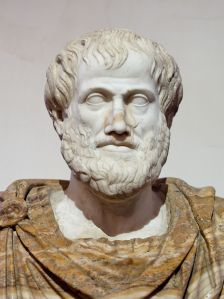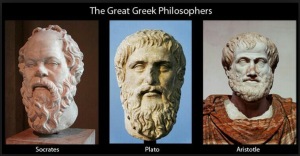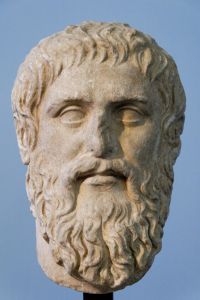
Aristotle –
Aristotle (384 BC – 322 BC) was a Greek philosopher and a scientist. –
Aristotle (/ˈærɪˌstɒtəl/; Greek: Ἀριστοτέλης Greek pronunciation: [aristotélɛːs], Aristotélēs; 384–322 BC) was a Greek philosopher and scientist born in the city of Stagira, Chalkidice, on the northern periphery of Classical Greece. His father, Nicomachus, died when Aristotle was a child, whereafter Proxenus of Atarneus became his guardian. At seventeen or eighteen years of age, he joined Plato’s Academy in Athens and remained there until the age of thirty-seven (c. 347 BC).
His writings cover many subjects – including physics, biology, zoology, metaphysics, logic, ethics, aesthetics, poetry, theater, music, rhetoric, linguistics, politics and government – and constitute the first comprehensive system of Western philosophy. Shortly after Plato died, Aristotle left Athens and, at the request of Philip of Macedon, tutored Alexander the Great beginning in 343 BC.
Teaching Alexander the Great gave Aristotle many opportunities and an abundance of supplies. He established a library in the Lyceum which aided in the production of many of his hundreds of books. The fact that Aristotle was a pupil of Plato contributed to his former views of Platonism, but, following Plato’s death, Aristotle immersed himself in empirical studies and shifted from Platonism to empiricism. He believed all peoples’ concepts and all of their knowledge was ultimately based on perception. Aristotle’s views on natural sciences represent the groundwork underlying many of his works.
Aristotle’s views on physical science profoundly shaped medieval scholarship. Their influence extended from Late Antiquity and the Early Middle Ages into the Renaissance, and were not replaced systematically until the Enlightenment and theories such as classical mechanics. Some of Aristotle’s zoological observations, such as on the hectocotyl (reproductive) arm of the octopus, were not confirmed or refuted until the 19th century. His works contain the earliest known formal study of logic, which was incorporated in the late 19th century into modern formal logic.
In metaphysics, Aristotelianism profoundly influenced Judeo-Islamic philosophical and theological thought during the Middle Ages and continues to influence Christian theology, especially the Neoplatonism of the Early Church and the scholastic tradition of the Roman Catholic Church. Aristotle was well known among medieval Muslim intellectuals and revered as “The First Teacher” (Arabic: المعلم الأول ).
His ethics, though always influential, gained renewed interest with the modern advent of virtue ethics. All aspects of Aristotle’s philosophy continue to be the object of active academic study today. Though Aristotle wrote many elegant treatises and dialogues – Cicero described his literary style as “a river of gold” – it is thought that only around a third of his original output has survived.
Aristotle – [Wikipedia ➜ Aristotle – ]
Quotes by Aristotle :
★ Knowing yourself is the beginning of all wisdom. — Aristotle
★ All men by nature desire knowledge. — Aristotle
★ A friend to all is a friend to none. — Aristotle
★ We are what we repeatedly do. Excellence, then, is not an act, but a habit. — Aristotle
★ What is a friend? A single soul dwelling in two bodies. — Aristotle
★



